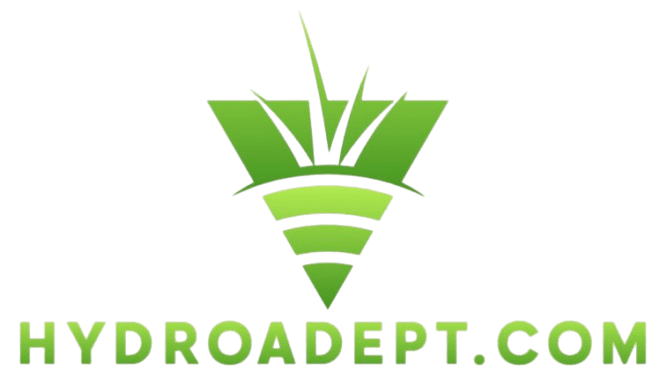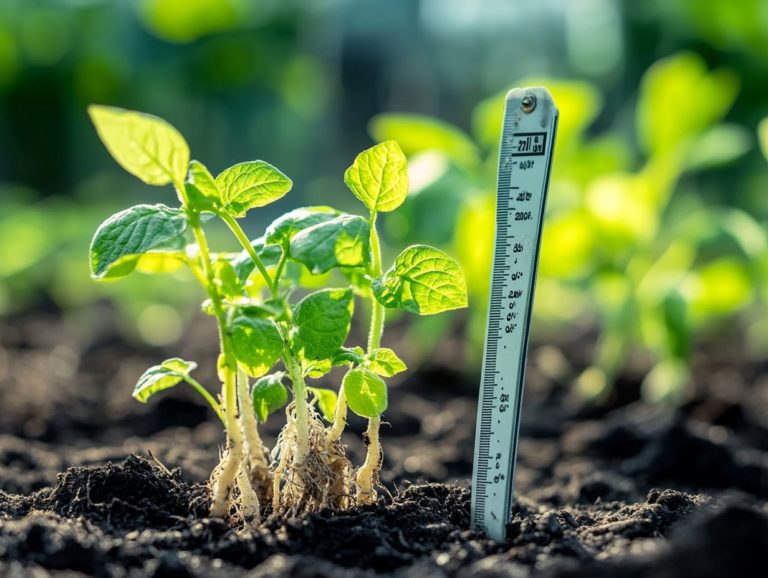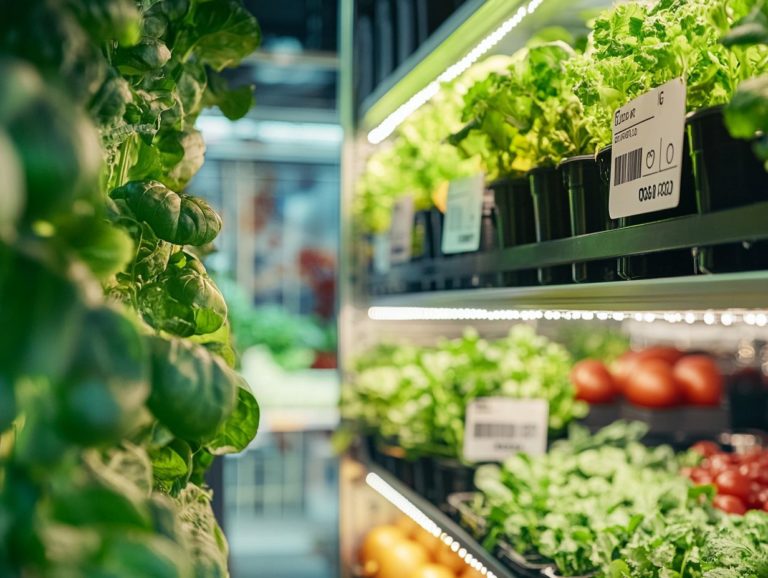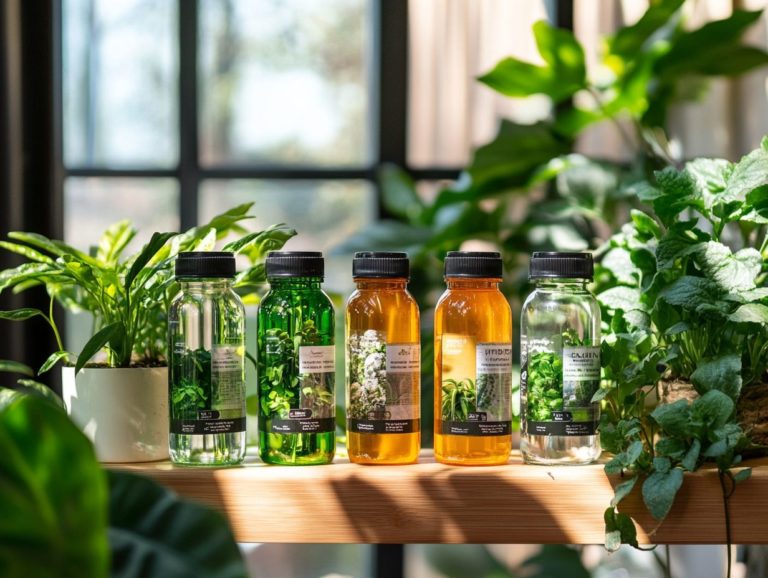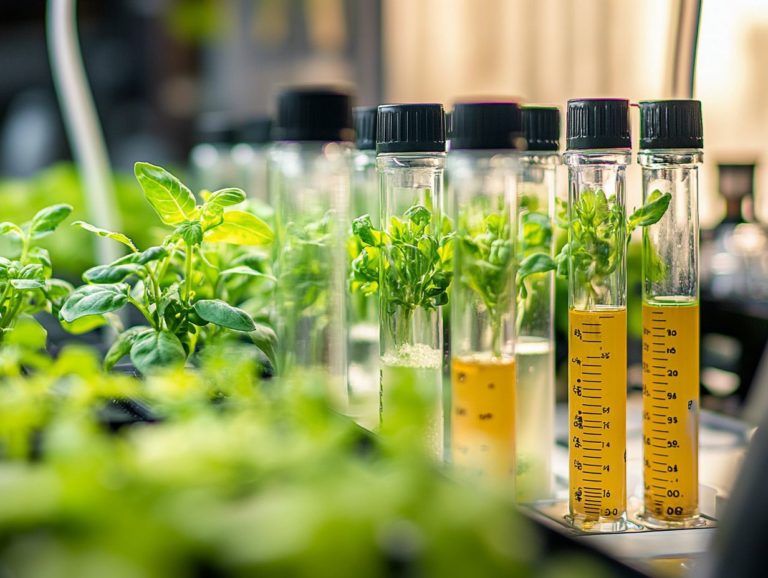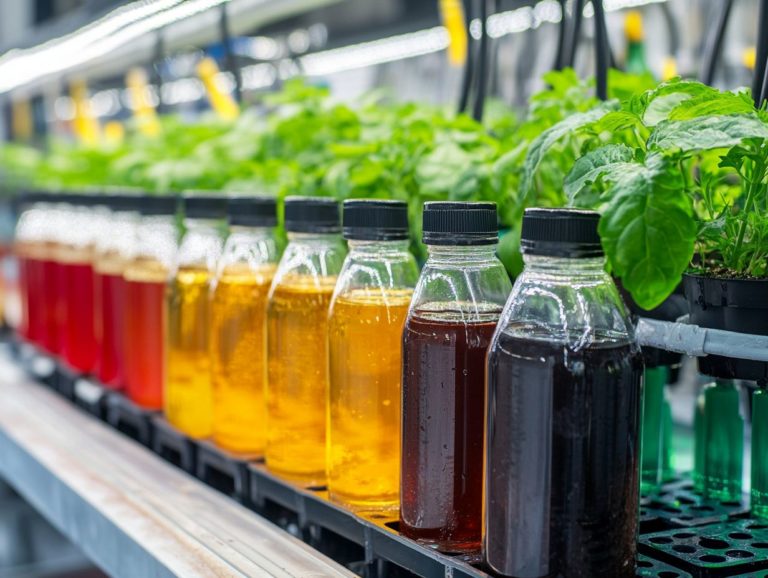Exploring Hydroponic Nutrient Formulations
Hydroponic gardening unveils a realm of possibilities. You can cultivate vibrant plants without soil. A crucial element in this method’s success lies in grasping hydroponic nutrient formulations.
This article delves into the diverse types of nutrient solutions, comparing both liquid and powder options. It also pinpoints the essential nutrients your plants require to truly thrive.
You ll discover how to craft your own nutrient recipes and select the most suitable products tailored to your specific plants. Get ready to dive into the exciting world of hydroponic gardening!
Contents
- Key Takeaways:
- What is Hydroponic Nutrient Formulation?
- Types of Hydroponic Nutrient Solutions
- Essential Nutrients for Hydroponic Plants
- Creating Your Own Nutrient Formulation
- Choosing the Right Nutrient Formulation for Your Plants
- Frequently Asked Questions
- What is hydroponic nutrient formulation?
- Why is exploring hydroponic nutrient formulations important?
- What are the main components of a hydroponic nutrient formulation?
- How do I know which nutrients to include in my hydroponic formulation?
- Can I create my own hydroponic nutrient formulation?
- How often should I change my hydroponic nutrient formulation?
Key Takeaways:
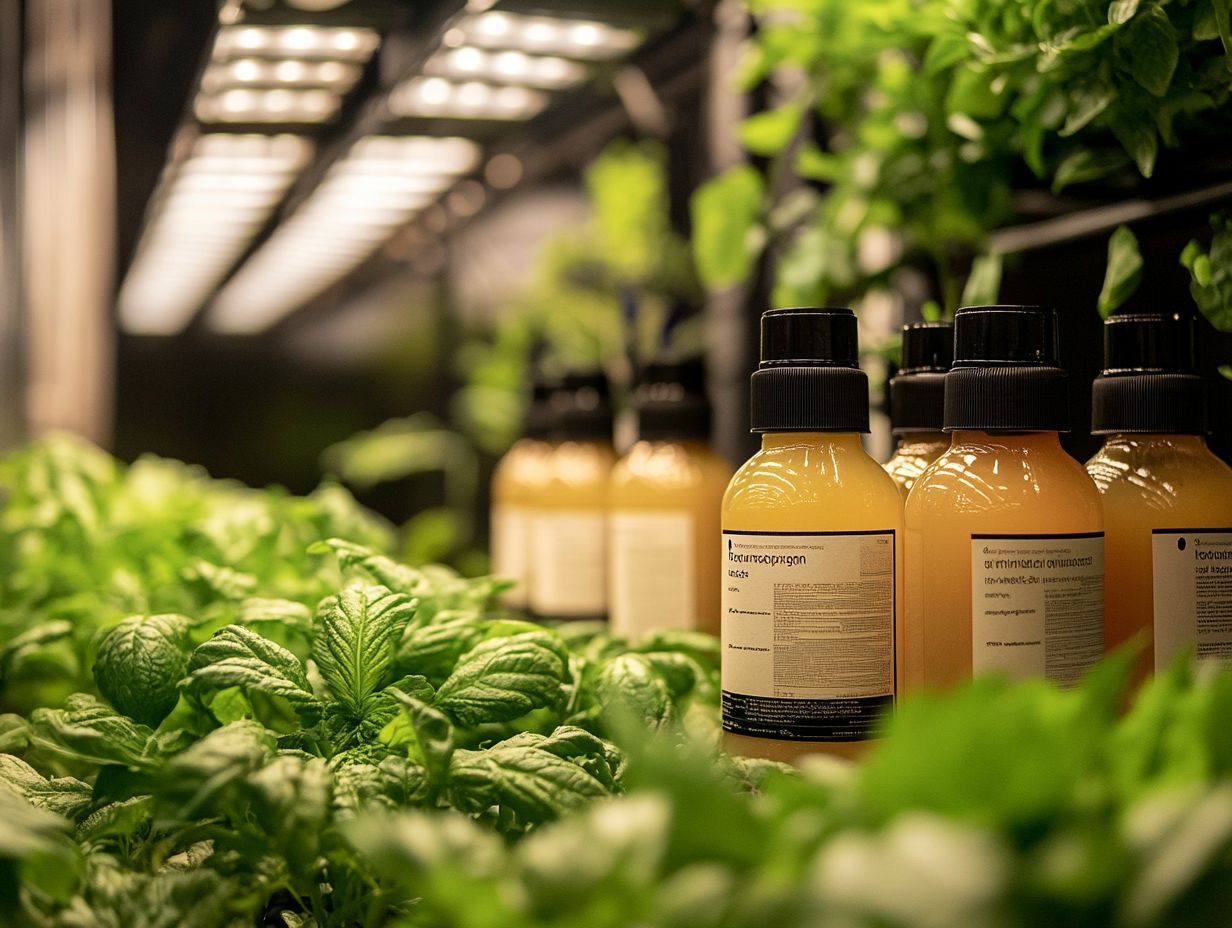
- Hydroponic nutrient formulations are essential for growing plants without soil.
- Choose between liquid and powder nutrients based on your gardening needs.
- Understanding and creating your nutrient formulation is key to successful hydroponics.
What is Hydroponic Nutrient Formulation?
Hydroponic nutrient formulation is the art and science of crafting specialized nutrient solutions designed just for your plants in a soil-less environment. This method of agriculture lets you cultivate plants efficiently in controlled settings.
Using precisely balanced mixtures of macronutrients (essential nutrients that plants need in large amounts) and micronutrients (needed in smaller amounts) like nitrogen, phosphorus, and potassium optimizes both health and yield while maximizing water efficiency. For those interested in deepening their knowledge, learning how to conduct hydroponic nutrient experiments can provide valuable insights.
You’ll often rely on complete fertilizers and tailored nutrient recipes that cater to the specific needs of your plants. Understanding hydroponic nutrient solutions is essential; maintaining a balanced nutrient solution is crucial as any imbalance can lead to deficiencies or toxicities that may hinder plant development.
Key nutrients such as calcium nitrate and magnesium sulfate aren’t just side players; they re crucial for strengthening plant structures and fueling metabolic processes, ultimately enhancing growth and quality.
Hydroponic systems provide remarkable advantages for urban farming. They enable you to make the most of limited space, achieve faster crop cycles, and use significantly less water than traditional methods. These benefits are vital as urban areas evolve and seek innovative solutions for sustainable food production.
Types of Hydroponic Nutrient Solutions
In the realm of hydroponics, you will encounter a variety of nutrient solutions designed to meet the specific growth needs of plants. The two primary categories are liquid and powder formulations, each offering unique advantages.
These options can be customized to create nutrient recipes that align perfectly with different hydroponic systems. Ultimately, this thoughtful selection plays a crucial role in revolutionizing the agriculture industry by enhancing both efficiency and productivity. For more insights, check out the best nutrient sources for hydroponic systems.
Comparing Liquid and Powder Formulations
When you compare liquid and powder formulations for hydroponic nutrient solutions, each option brings distinct advantages that can profoundly impact your plants’ growth and health. Liquid formulations allow for immediate nutrient uptake, while powder formulations provide a longer shelf life and the flexibility to craft tailored nutrient recipes.
Liquid nutrients dissolve swiftly in water, making them perfect for quick absorption by your plants. This can lead to faster growth rates. However, this rapid uptake means you’ll need to apply them more frequently to keep those nutrient levels at their peak.
On the flip side, powdered nutrients present a cost-effective alternative, as they tend to last longer and can be mixed to precise concentrations based on your plants’ evolving needs. This ability to create custom solutions enhances efficiency and adaptability, catering to various growth stages and plant species, ultimately boosting overall plant health and yield.
Start your hydroponic journey today and transform your gardening experience!
Essential Nutrients for Hydroponic Plants
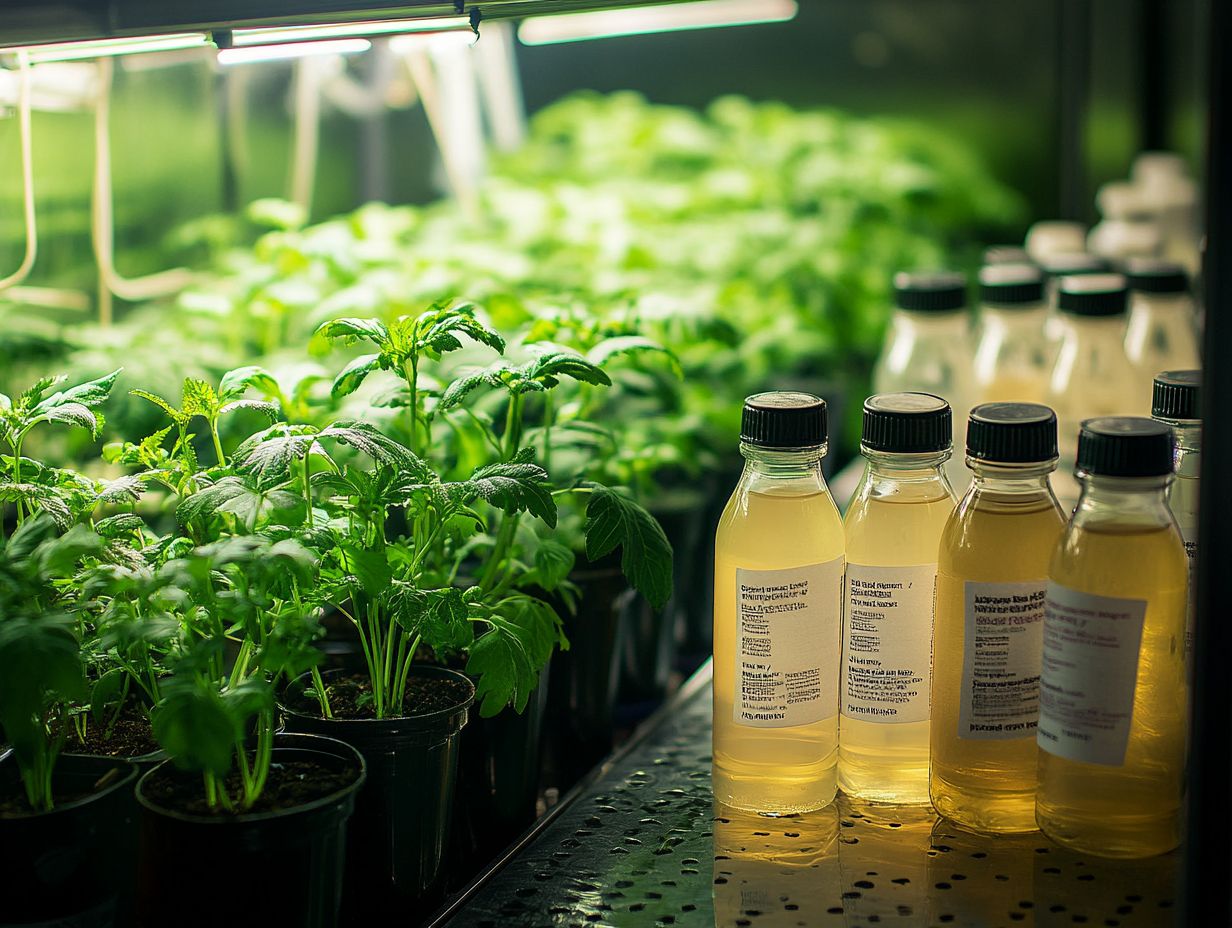
Essential nutrients are vital for your success in cultivating hydroponic plants, encompassing a wide array of macronutrients and micronutrients necessary for their optimal growth.
You need to ensure that key elements like calcium, nitrogen, potassium, phosphorus, and magnesium sulfate are perfectly balanced. This careful calibration creates a nutrient-rich environment where your plants can truly thrive. For those new to this method, exploring hydroponic nutrients: a beginner’s guide can be invaluable in enhancing their health and productivity.
Identifying and Understanding Key Nutrients
Identifying and understanding key nutrients is essential for you as a hydroponic grower. Nutrient deficiencies, like phosphorus deficiency, can significantly impact the health and yield of your plants. Keep a close eye on the intake of essential elements like calcium nitrate. This helps tackle issues related to nitrogen fixation the process where nitrogen in the atmosphere is converted into a usable form for plants and ensures your plants get the micronutrients they need for vigorous growth.
To accurately pinpoint any deficiencies, conducting a foliar analysis—a method that tests the leaves of your plants to check their nutrient levels—will serve you well. This process provides valuable insights. Each nutrient has its own specific role; for example, potassium is vital for regulating water, while magnesium plays a key part in chlorophyll production. For a deeper understanding of how these elements interact, refer to understanding hydroponic nutrient relationships.
Being able to recognize signs like yellowing leaves or stunted growth is crucial, as these can indicate a need for targeted interventions. Addressing these deficiencies may involve tweaking your nutrient solutions or incorporating organic fertilizers packed with the missing elements. For a deeper understanding of what your plants need, check out the top hydroponic systems and their nutrient needs, giving you the power to help your plants thrive and reach their full potential in a hydroponic setting.
Creating Your Own Nutrient Formulation
Crafting your own nutrient formulation can be thrilling! It allows you to customize nutrients just right for your hydroponic plants. This approach enables you to optimize fertilizer programs, significantly enhancing plant health and growth.
By gaining a solid understanding of chemical analysis, including the role of elements like Manganese, Zinc, and Boron, and the unique requirements of your plants, you can devise a nutrient mix that fully leverages the advantages of hydroponic systems. For more detailed insights, check out understanding hydroponic nutrient solutions.
Factors to Consider and Recipe Tips
When crafting nutrient recipes for hydroponic systems, you must consider several key factors to optimize plant health and water efficiency. This includes the specific growth stages of your plants and the prevailing environmental conditions. Well-thought-out recipe tips can give you the power to make informed decisions regarding nutrient composition and application timing.
Understanding the ideal pH levels for the various types of plants you’re growing can significantly enhance nutrient absorption, as extremes in pH can impede growth. Timing the delivery of nutrients according to different growth stages is equally crucial; for example, seedlings typically require a different concentration than mature plants. For more insights, consider exploring nutrient delivery methods in hydroponics.
Regularly monitoring and adjusting your nutrient mix can yield impressive results throughout each lifecycle phase. By implementing water-efficient practices, such as recirculating systems or drip irrigation, you can conserve resources while ensuring a consistent supply of nutrients.
By integrating these strategies, you can create well-rounded and effective nutrient recipes that truly support your hydroponic endeavors.
Choosing the Right Nutrient Formulation for Your Plants
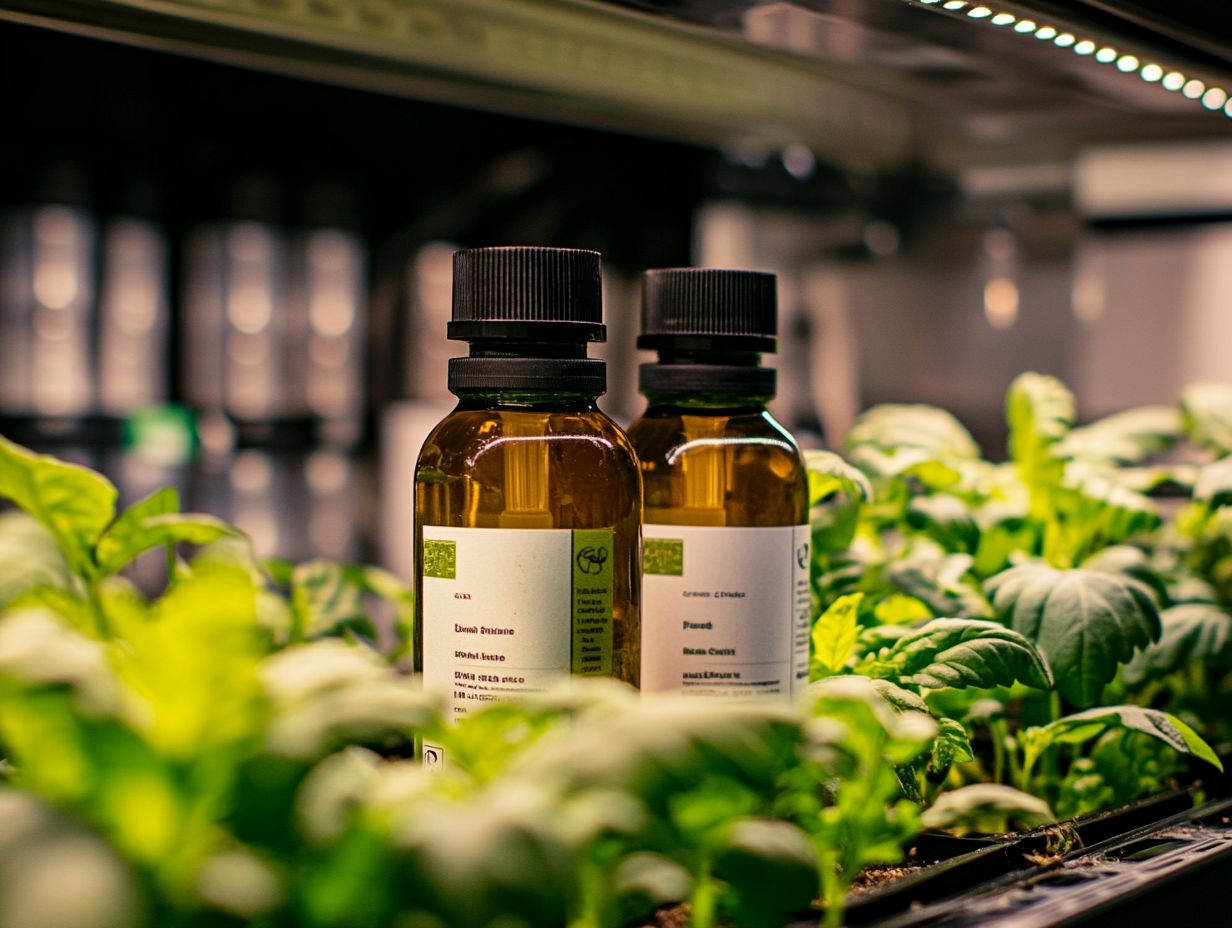
Selecting the ideal nutrient formulation for your plants is a pivotal choice that can profoundly influence their overall health and productivity. It’s essential to carefully assess the specific needs of your hydroponic systems and the plants you are cultivating.
By exploring various fertilizer programs and recommended products, you can refine your nutrient management strategy, optimizing the growth potential of your plants. Additionally, learning how to make your own hydroponic nutrient mix can further enhance your approach.
Factors to Consider and Recommended Products
When selecting nutrient solutions for your hydroponic systems, consider vital factors, including plant species and growth stage, to boost your yield substantially! A thorough evaluation of recommended products is essential. Understanding these elements can lead to notable improvements in plant health, especially in urban farming settings where space and resources may be constrained.
pH levels are crucial for nutrient availability. Different plants thrive within specific pH ranges. For example, leafy greens typically prefer a pH of 6.0 to 7.0, while fruiting plants may require slightly acidic conditions.
Water quality affects how well your plants absorb nutrients. Check for important minerals and contaminants to ensure optimal growth. To enhance your crop yield, exploring products like General Hydroponics Flora Series can offer a well-balanced nutrient base suitable for various plants at different growth stages. Additionally, considering organic nutrient options for hydroponic systems can further improve your gardening results.
Advanced Nutrients pH Perfect series helps maintain optimal pH levels, reducing the need for constant monitoring. Rooting supplements like RapidStart strengthen root systems and accelerate growth, making them valuable in early plant development.
Frequently Asked Questions
What is hydroponic nutrient formulation?
Hydroponic nutrient formulation is the process of creating a balanced and customized blend of essential nutrients for plant growth in a hydroponic system, such as those utilized in Hydro-Gardens.
Why is exploring hydroponic nutrient formulations important?
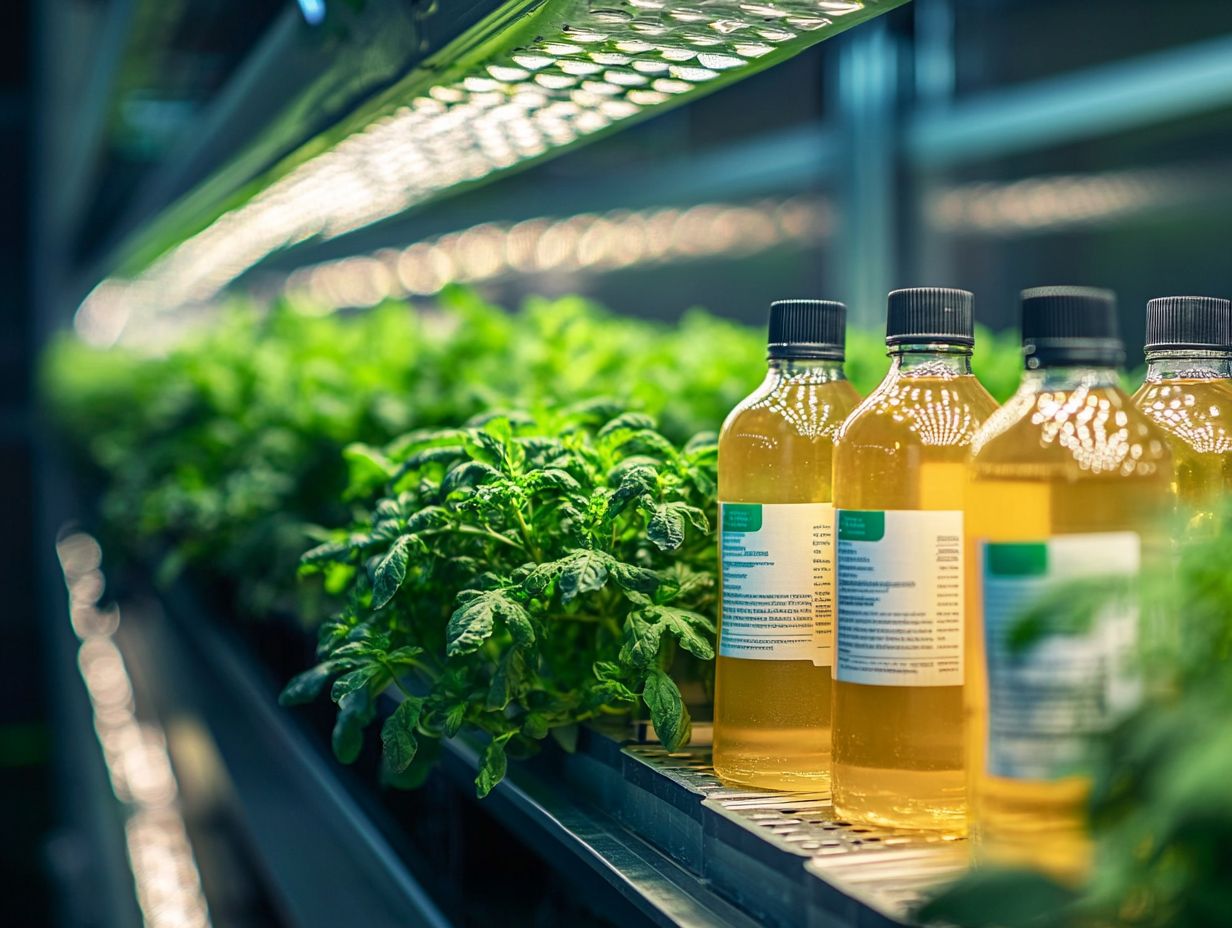
Exploring hydroponic nutrient formulations helps growers tailor their nutrient solution to the specific needs of their plants, whether grown in soil-less media or traditional methods, leading to healthier and more productive growth.
What are the main components of a hydroponic nutrient formulation?
The main components of a hydroponic nutrient formulation are major nutrients (Nitrogen, Phosphorus, and Potassium), minor nutrients (Calcium, Magnesium, Iron, Manganese, Zinc, Boron, and Molybdenum), and supplements (amino acids, enzymes, hormones, etc.).
How do I know which nutrients to include in my hydroponic formulation?
It is important to consider the specific needs of the plants you are growing, such as their requirements for Calcium nitrate or Magnesium sulfate, as well as the stage of growth they are in. Conducting regular water and soil tests can also help determine which nutrients, like Ammonium or Potassium phosphate, are lacking and need to be added to the formulation.
Can I create my own hydroponic nutrient formulation?
Yes, it is possible to create your own hydroponic nutrient formulation with the right knowledge and resources. However, it is recommended to consult with a hydroponic expert or use pre-made nutrient mixes to ensure proper balance and effectiveness.
How often should I change my hydroponic nutrient formulation?
Change your nutrient formulation every 1-2 weeks to keep your plants thriving! Regular checks are vital to avoid deficiencies, particularly in the context of Hydroponics. However, this may vary depending on the type of plants and growth stage, so regular monitoring is important.
